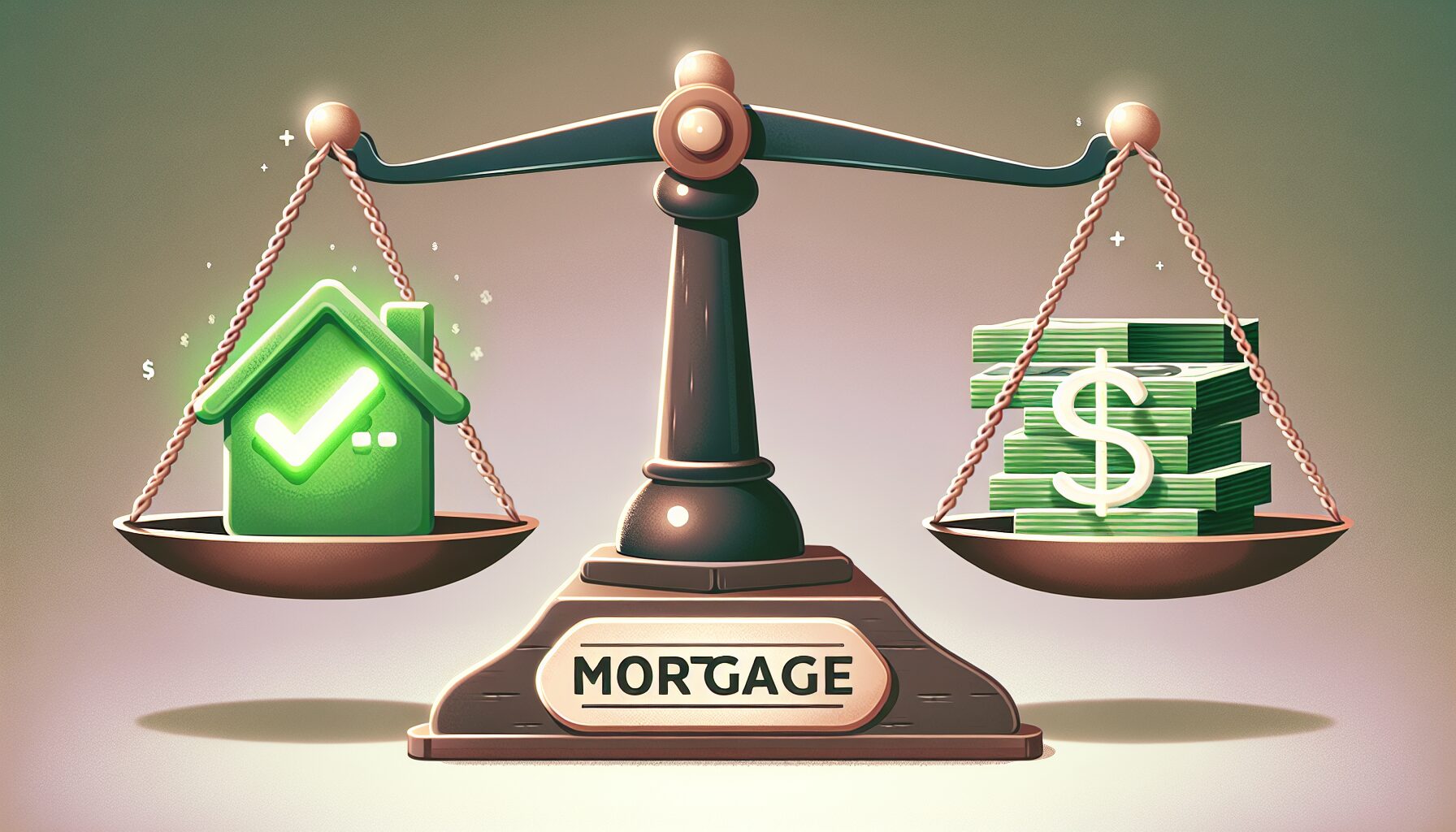
If you’re considering buying a home, one important factor you’ll need to consider is your credit score. Your credit score plays a crucial role in determining whether or not you’ll be able to qualify for a mortgage. But what is the lowest credit score allowed for a mortgage? In this article, we’ll explore this question and provide you with the essential information you need to know about credit scores and mortgages. Whether you’re a first-time homebuyer or looking to refinance, understanding the minimum credit score requirements will help you navigate the homebuying process with confidence.
Table of Contents
Factors Affecting Mortgage Approval
When applying for a mortgage, there are several factors that lenders take into consideration to determine your eligibility for approval. These factors include your credit score, debt-to-income ratio, payment history, employment history, down payment amount, and the type of loan you are applying for. Understanding these factors and their impact can help you prepare for the mortgage approval process and increase your chances of securing a loan.
Credit Score
Your credit score is one of the most important factors that lenders look at when evaluating your mortgage application. It is a numerical representation of your creditworthiness and provides insights into your past financial behavior. Lenders use credit scores as a measure of risk, as it helps them gauge your ability to repay the loan.
Debt-to-Income Ratio
Another crucial factor in mortgage approval is your debt-to-income ratio (DTI). This ratio compares your monthly debt payments to your gross monthly income. Lenders prefer borrowers with a lower DTI, as it indicates a greater ability to manage mortgage payments. A high DTI may raise concerns about your ability to make timely payments and can affect your chances of getting approved for a mortgage.
Payment History
Your payment history reflects how responsible you are in making your debt payments. Lenders review your payment history to assess your reliability and determine the likelihood of you making timely mortgage payments. Late payments, delinquencies, or defaults can significantly impact your credit score and decrease your chances of mortgage approval.
Employment History
Steady employment is essential for mortgage approval. Lenders want to ensure that you have a stable source of income to meet your mortgage obligations. They assess your employment history to evaluate your likelihood of continued income. Consistent employment with the same employer or in the same field is generally preferred by lenders.
Down Payment
The down payment amount plays a significant role in mortgage approval. A higher down payment reduces the lender’s risk and indicates your commitment to the loan. It can also affect the loan-to-value ratio (LTV), which is the percentage of the loan amount compared to the appraised value of the property. Generally, a lower LTV is preferred by lenders as it reduces their exposure to potential losses.
Loan Type
The type of loan you apply for also affects your mortgage approval. Different loan programs have varying credit score requirements, down payment requirements, and eligibility criteria. Understanding the different loan types can help you determine which one suits your financial situation and increases your chances of approval.
Importance of Credit Score
Your credit score is a critical factor in mortgage approval. It provides lenders with an indication of your past financial behavior and helps them evaluate your creditworthiness. A higher credit score improves your chances of securing a mortgage and may even lead to more favorable interest rates.
Credit Score Overview
Your credit score is a three-digit number that ranges from 300 to 850. It is calculated based on information from your credit report, including your payment history, credit utilization, length of credit history, types of credit, and new credit applications. The higher your credit score, the better your chances of mortgage approval.
Credit Score Ranges
Credit scores are typically categorized into different ranges to help lenders assess your creditworthiness. The most commonly used range is:
- Excellent: 740 and above
- Good: 670-739
- Fair: 580-669
- Poor: Below 580
Lenders’ Risk Assessment
Lenders evaluate credit scores as part of their risk assessment process. A higher credit score indicates a lower risk of defaulting on the loan, making you a more attractive borrower. It shows that you have a history of responsible financial behavior and are likely to make timely mortgage payments.
Interest Rates
Your credit score can also impact the interest rate you are offered on your mortgage loan. Borrowers with higher credit scores typically qualify for lower interest rates, which can result in significant savings over the life of the loan. Conversely, borrowers with lower credit scores may face higher interest rates as lenders perceive them as higher risk.

Minimum Credit Score Requirements
Different loan programs have varying minimum credit score requirements. While some programs have more flexible requirements, others have stricter guidelines. Understanding these requirements can help you determine which loan program aligns with your credit profile.
General Minimum
The general minimum credit score requirement for most mortgage programs is around 620. However, this may vary depending on the lender and other factors. It’s important to note that while 620 is often the minimum threshold, having a higher credit score will increase your chances of approval and potentially lead to more favorable loan terms.
FHA Loans
FHA loans, insured by the Federal Housing Administration, are known for their more lenient credit score requirements. The minimum credit score needed for an FHA loan is typically lower than conventional loans, making it more accessible to borrowers with less-than-perfect credit. With an FHA loan, you may be approved with a credit score as low as 500, although a higher score may be required in some cases.
VA Loans
VA loans, available to eligible veterans and active-duty military members, also have more relaxed credit score requirements. While there is no official minimum credit score for a VA loan, most lenders prefer applicants with a credit score of at least 620. VA loans offer various benefits, such as no down payment requirement and competitive interest rates.
USDA Loans
USDA loans, designed for low-to-moderate income borrowers in rural areas, have slightly stricter credit score requirements than FHA and VA loans. Most lenders require a minimum credit score of 640 to qualify for a USDA loan. However, exceptions can be made for borrowers with compelling compensating factors, such as stable employment and a solid payment history.
Conventional Loans
Conventional loans, not insured or guaranteed by any government agency, tend to have higher credit score requirements compared to FHA, VA, and USDA loans. Most lenders prefer borrowers with a credit score of at least 620 for conventional mortgage approval. However, to secure more favorable terms, such as lower interest rates and down payment requirements, a credit score of 740 or higher is often recommended.
Jumbo Loans
Jumbo loans, which exceed the loan limits set by government-backed loan programs, typically have stricter credit score requirements. Lenders may require a credit score of 700 or higher to qualify for a jumbo loan. Since jumbo loans involve larger loan amounts, lenders are more cautious and often seek borrowers with excellent credit histories.
General Minimum Credit Score
While there are specific minimum credit score requirements for different loan programs, it’s important to note that these are general guidelines, and individual lenders may have their own standards. Lenders take into account various factors when reviewing mortgage applications, and the credit score requirement is just one piece of the puzzle.
Typical Range
Although the general minimum credit score requirement is around 620, it’s important to aim for a higher credit score whenever possible. A credit score in the range of 670-739 is considered good, and scores above 740 are considered excellent. The higher your credit score, the more likely you are to qualify for a mortgage and secure better loan terms.
Exceptions
While most lenders follow established guidelines, they may occasionally make exceptions based on unique circumstances. For example, if you have a high income, a substantial down payment, or significant cash reserves, lenders may be willing to overlook a lower credit score. It’s essential to work closely with a mortgage professional to explore all options and determine the best approach for your specific situation.
Lenders’ Discretion
It’s important to remember that lenders have the final say in approving or denying mortgage applications. While you may meet the minimum credit score requirement, lenders also consider other factors, such as your income, debt-to-income ratio, and employment history. They may evaluate your overall financial profile before making a decision.
Other Compensating Factors
If your credit score falls below the minimum requirement, you can still enhance your mortgage application by presenting other compensating factors. These factors may include a high income, substantial assets, a long and stable employment history, or a sizable down payment. Demonstrating financial stability and responsibility in areas other than your credit score can help mitigate potential concerns.

FHA Loans
FHA loans are popular among first-time homebuyers and individuals with lower credit scores. These government-insured loans provide opportunities for borrowers who may not qualify for conventional loans.
Overview
FHA loans are backed by the Federal Housing Administration and allow borrowers to finance a home with a lower down payment and lower credit score requirements. These loans aim to make homeownership more accessible to a broader range of individuals.
Minimum Credit Score Requirement
The minimum credit score requirement for an FHA loan depends on the lender. While the FHA itself does not have a specific credit score threshold, most lenders require a credit score of at least 580 to qualify for a 3.5% down payment. However, borrowers with a credit score between 500 and 579 may still be eligible with a 10% down payment.
Benefits
One of the significant advantages of FHA loans is their more lenient credit score requirements. Borrowers with lower credit scores can still qualify for an FHA loan, making it an appealing option for those who may have experienced financial challenges in the past. Additionally, FHA loans offer competitive interest rates and allow for lower down payments compared to conventional loans.
Drawbacks
FHA loans require borrowers to pay mortgage insurance premiums (MIP), which add to the overall cost of the loan. This insurance is required for the life of the loan for borrowers who make a down payment of less than 10%. Additionally, FHA loans have strict appraisal guidelines, which can affect the types of properties that qualify for financing.
VA Loans
VA loans are a great option for eligible veterans, active-duty military members, and their spouses. These loans offer favorable terms and support homeownership for those who have served in the military.
Overview
VA loans are guaranteed by the Department of Veterans Affairs and are designed to help veterans and military personnel purchase homes with little to no down payment. They offer various benefits and favorable terms to support those who have served our country.
Minimum Credit Score Requirement
The VA does not have a specific minimum credit score requirement for VA loans. However, most lenders prefer applicants with a credit score of at least 620. A higher credit score may increase your chances of approval and may lead to more favorable loan terms.
Benefits
VA loans have several advantages, including no down payment requirement, no private mortgage insurance (PMI), and competitive interest rates. These benefits make VA loans an attractive option for eligible veterans and active-duty military members looking to purchase a home. VA loans also provide flexibility in qualifying criteria, allowing for compensating factors to be considered during the underwriting process.
Drawbacks
One potential drawback of VA loans is the funding fee, which is a one-time payment paid by the borrower. This fee helps offset the cost of the loan program and varies depending on factors such as the borrower’s military category, down payment amount, and whether it is the borrower’s first VA loan. Additionally, VA loans may have stricter appraisal requirements to ensure the property’s suitability and value.

USDA Loans
USDA loans are specifically designed to help low-to-moderate income borrowers purchase homes in eligible rural areas. These loans offer attractive benefits and support homeownership in rural communities.
Overview
USDA loans are guaranteed by the United States Department of Agriculture and are intended to promote rural development and sustainable homeownership. They offer affordable financing options for eligible borrowers who may not qualify for conventional loans.
Minimum Credit Score Requirement
Most lenders require a minimum credit score of 640 to qualify for a USDA loan. However, exceptions may be made for borrowers with compelling compensating factors, such as a stable employment history, low debt-to-income ratio, or a solid payment history. USDA loans prioritize the borrower’s ability to repay the loan over their credit score.
Benefits
One of the main benefits of USDA loans is the option for 100% financing, meaning no down payment is required. These loans also have lower interest rates compared to some other loan programs. Additionally, USDA loans offer flexible credit guidelines, making them more accessible to borrowers with limited credit history or lower credit scores.
Drawbacks
While USDA loans offer attractive benefits, they are limited to eligible rural areas. Borrowers must meet specific location and income requirements to qualify for USDA financing. Additionally, USDA loans require upfront and annual fees, including a guarantee fee and mortgage insurance, which increase the overall cost of the loan.
Conventional Loans
Conventional loans are not insured or guaranteed by any government agency, and they offer a range of options for borrowers with different financial profiles.
Overview
Conventional loans are traditional mortgage loans offered by private lenders. They typically have stricter credit score requirements and down payment requirements compared to government-backed loans. Conventional loans offer flexibility and cater to borrowers who meet specific credit and financial criteria.
Minimum Credit Score Requirement
Most lenders prefer borrowers to have a credit score of at least 620 to qualify for a conventional loan. However, to secure more favorable loan terms, such as lower interest rates and down payment requirements, a credit score of 740 or higher is often recommended. Lenders consider various factors beyond just the credit score when evaluating conventional loan applications.
Benefits
Conventional loans offer greater flexibility in terms of property type and loan amount compared to government-backed loans. They may be suitable for borrowers with stronger credit profiles and higher down payment amounts. Additionally, conventional loans allow borrowers to avoid ongoing mortgage insurance premiums once they reach a certain level of equity in their homes.
Drawbacks
Conventional loans typically require a down payment of at least 3% of the purchase price, with larger down payments often resulting in better loan terms. Private mortgage insurance (PMI) may also be required for borrowers who make a down payment of less than 20%. PMI adds to the overall cost of the loan until the borrower reaches the equity threshold to remove it.

Jumbo Loans
Jumbo loans are designed for borrowers seeking financing for high-value homes that exceed the loan limits set by government-backed loan programs.
Overview
Jumbo loans are non-conforming loans that exceed the loan limits set by Fannie Mae and Freddie Mac, which are the government-sponsored enterprises responsible for setting loan limits for conventional loans. These loans are typically used for luxury properties or in high-cost areas where housing prices exceed the conforming loan limits.
Minimum Credit Score Requirement
Jumbo loan credit score requirements vary among lenders. Generally, a credit score of 700 or higher is required to qualify for a jumbo loan. The higher loan amounts involved in jumbo loans make lenders more cautious, as they assume higher risks.
Benefits
Jumbo loans allow borrowers to finance high-value properties that may not qualify for conventional loan financing due to loan limits. These loans provide greater flexibility in terms of loan structure and customization. They can also be used for investment properties and second homes. Jumbo loans offer well-qualified borrowers the opportunity to secure their dream homes with competitive interest rates and flexible terms.
Drawbacks
One of the main drawbacks of jumbo loans is the higher credit score requirement compared to other loan types. Borrowers must have excellent credit histories and solid financial profiles to qualify. Additionally, jumbo loans may have stricter underwriting requirements, longer processing times, and higher closing costs compared to traditional mortgage options.
Conclusion
When applying for a mortgage, it’s essential to consider the factors that affect mortgage approval. Your credit score, debt-to-income ratio, payment history, employment history, down payment amount, and the type of loan all play a significant role in determining your eligibility. Understanding the minimum credit score requirements for different loan programs and the benefits and drawbacks of each can help you make informed decisions and improve your chances of securing a mortgage loan that aligns with your financial situation. Working with a knowledgeable mortgage professional can also provide guidance and support throughout the mortgage approval process. Remember, a strong credit score and a solid financial profile can increase your chances of becoming a homeowner and pave the way for a successful mortgage journey.








